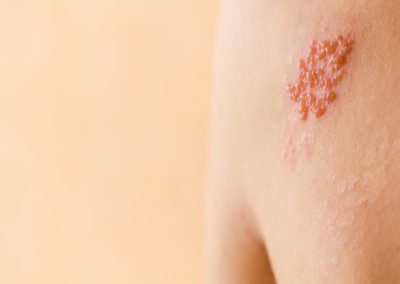Shingles
What is shingles?
- Shingles is a localised, painful and blistering rash caused by the reactivation of the varicella-zoster virus (chicken pox virus).
- It can occur in anyone who has previously had chicken pox.
- About 1 in 3 people will get shingles in their lifetime.
- Whilst shingles can occur in childhood it is much more common in adults, especially in the over 60s.
- Cancer patients also have an increased risk along with other patients who have a suppressed immune system after organ transplant or patients with HIV.
- The good news is that once people have had shingles the first time, they are unlikely to get a second episode.
- The likelihood of this happening is less than 1%.
What are the symptoms of shingles?
- The first symptoms of shingles may be localised pain without tenderness to the touch or any visible changes to the skin.
- Within 1-3 days a blistering, somtimes tingling or burning rash appears, usually starting as a crop of red papules along the nerve.
- These fluid filled blisters may be painful and itch, and eventually crust over, usually in 7-10 days.
- Fever, headache, abdominal pain and other body aches are other symptoms.
- Shingles typically only affects one side of the body (classically at the midline torso front and back, generally always on one side).
- It can also appear on the neck or face, buttocks, ears and eyes as a blistering “band of rash”.
- Sometimes shingles can cause pain with no rash “sine eruptione” or rash without pain, most often in children.
- In uncomplicated cases, full recovery is 3-4 weeks.
- It is vital that antivirals are taken within 72 hours of symptoms to be signficiantly effective.
- A rare but very serious complication of shingles is a rash that involves the eye and should be treated immediately with antivirals to avoid permanent eye damage.
- Other rare, but serious symptoms include loss of hearing or intense pain in one ear which can be symptoms of Ramsay Hunt Syndrome (herpes that impacts the ear).
- Again urgent treatment with antivirals within 72 hours can help avoid permanent hearing damage.
- Untreated shingles rash on the scalp (you’ll notice when coming) is also important as scalp treatment untreated can lead to permanent baldness.
What triggers shingles?
Triggers that reactivate the dormant zoster virus include:
- Contact with someone who has chicken pox or shingles
- An infection
- Chemotherapy patients have a 40% increased risk
- Spinal surgery
- Radiotherapy at the affected nerve root
- Medications that weaken the immune system after organ transplant can increase the risk of shingles
What are the treatments for shingles?
- Antivirals started within 1-3 days of symptoms – Acyclovir 3 times daily for 7 days is common course of treatment.
- Valacyclovir and famciclovir are other options with similar action
- Antibiotics can be used for secondary infections
- Paracetomol can be given for pain
- Bedrest and fluids will aid recovery
- Avoid contact with other people when rash is exposed
What are the complications of shingles?
- Although most shingles patients will recover fully, a painful (and sometimes chronic) complication of shingles is postherpetic neuralgia.
- This is defined as persistence or recurrence of pain in the same area more than a month after the rash presented, and for some patients a type of phantom pain remains many months after the infection has healed.
- The duration of PHN tends to be longer as the patient increases in age. In most cases it will last only a few months, but rarely for years.
- It may cause continuous sensitivity in the area where the rash was or a continuous burning sensation or shooting pain or itch.
- Early use of antiviral is vital
- Other treatments include topical capsaicin (to reduce burn), tricyclic antidepressants or anti-epileptic medications gabapentin and pregabalin may be useful for nerve pain and mood at the same time.
- Other treatments include electrical nerve stimulation or botulinum toxin injected into the affected area.
Is shingles contagious?
- You can’t catch shingles from someone with shingles, but you can get chickenpox from shingles.
- Shingles can be spread by contact with an oozing blister however so it is important blisters are covered or have formed scabs.
- If you have shingles it is important not to touch the blisters and wash hands often and avoid contact with people who are pregnant or have weakened immune systems.
Why is your GP so important in the treatment of shingles?
- Any patient should urgently see their GP within at least 72 hours of shingles symptoms appearing (eve if there is not rash), so antivirals can be administered.
- GPs most frequently can easily treat uncomplicated shingles cases.
- For complications of shingles, your GP may refer to a dermatologist but always remember prompt treatment is the best course of treatment and that frequently means weekends when GPs are more likely to be open, while many specialists are not.
- If you develop shingles at the beginning of the week, you may also call our urgent clinic details can be found here.
How can I prevent shingles?
- Ask your GP or dermatologist about the shingles vaccine which can be administered to all adults over 50, and younger people who have a weakened immune system, which increases the risk of shingles.
- You can get the vaccine even if you have had shingles or chickenpox in the past, and it has been found to be more than 90% effective in preventing shingles.


